








For the first time postpandemic, Utica University will host America’s Greatest Heart Run & Walk on March 2, along with the Healthy for Good Expo on March 1. This year, the locally renowned event will celebrate its 50th anniversary.
Director of Physical Education and Athletics
David Fontaine said Utica University holds deep ties with the event and he was excited for its return.
“For several years prior to COVID, we were the hub of America’s Greatest Heart Run and Walk,” Fontaine said. “It’s a big and great event, we’re expecting a high turn out and we’re really looking forward to it.”
According to Fontaine, students should expect the Harold T. Clark Athletic Center to be a busy location around the time of the event, as the majority of operations for it will be based inside.
“From the athletic perspective, we need to make sure our teams are accommodated,” Fontaine said. “Most likely,

practices will be moved to [the Todd & Jen Hutton Sports Dome], while from Thursday to the Saturday that the Heart Run takes place, the gym is handed over to the American Heart Association.”
The Clark Athletic Center gymnasium will be staged to host the Healthy for Good Expo, while the fundraising telethon hosted by WKTV and operated by select student athletes will take place in the gymnasium classroom, Fontaine said.
Planning for such a large and complex event has taken approximately five months, according to the Vice President of
Facilities and Emergency Management Shad Crowe. The time frame comes as a result of the need to coordinate many different groups.
“For those two days we will have a significantly large number of people visiting the campus,” Crowe said. “There are many groups involved in the event who have a vested interest in the planning process. University facilities, campus safety, and IITS all have tremendous responsibility for portions of the event.”
In order to properly host the event, certain areas will be used and
restricted from student access, according to Crowe. Those areas include the Miga Court, the Clark Athletic Center gymnasium classroom, and portions of parking lots B and C.
“Our University community will receive multiple messages in the coming days reminding everyone of the event,” Crowe said. “Messaging will include road closures, parking lot areas that will be impacted, and of course the importance of paying attention to surroundings and activities.”
The most impactful of changes students can expect for the event is the closure of both the Burrstone Road and Champlin Avenue entrances, Crowe said. Students will receive updates regarding alternative entrance and exit routes closer to the date of the event.
For more information on America’s Greatest Heart Run & Walk, or to participate in the event, visit the American Heart Association’s website at www.heart.org.



@UticaTangerine


@Utica_Tangerine
@Utica_Tangerine
Editor-In-Chief - Isa Hudziak
Managing Editor - Diana Sidorevich
Layout Editor - Chakradhar Palli
Features Editor - Breannan O’Hara
Sports Editor - Brady Barnard
Online and Social Media Manager - Eleanor Berkhoudt
Senior Feature Writer - Charles Buckley
Senior News Reporter - Kayden Lamphere
Sports Reporter - Nick Phillips
Staff Photographer - Luke Reed
Circulation Manager - Juan Alvarez Garcia Adviser - Mary Christopher
The Tangerine is published biweekly during the academic year by and for Utica University students. To reach a member of the staff, email tanger@utica.edu or call 315-792-3065. All material printed in The Tangerine is copyrighted. The Tangerine was first published as the Utica College News on Nov. 6, 1946.
Letters to the editor are welcomed from all members of the Utica University community. Letters must meet fair and accurate publishing standards and contain no libelous material. Anonymous letters to the editor will not be printed. All letters and editorials must meet the print deadline of 5 p.m. on Mondays. Please send all submissions to tanger@utica.edu. Takeback requests are a form of censorship and therefore not accepted.
The Tangerine accepts paid advertisements. Advertising copy is subject to the same professional publishing standards as content. The Tangerine reserves the right to reject advertising that does not meet the standards established, is libelous, is in poor taste or violates discrimination laws. Please direct all inquiries to tanger@utica.edu. The deadline for publication is 10 a.m. on Tuesdays.
The opinions and columns expressed in The Tangerine are those of the individual writers and do not represent the views of The Tangerine or Utica University.




UTICA, NY– “Little Women,” the Broadway Musical is coming to Utica’s Stanley Theatre on Thursday, March 21.
“Little Women” tells the story of sisters Jo, Meg, Beth and Amy March as they traverse through life as they deal with tragedy, love and the transition into womanhood.
Noa Harris will play the role of Amy March, the youngest of the March sisters. She said that this role was particularly exciting to play because she knows how loved the story is and how much the characters mean to people. Harris also said that she has a personal connection to the story as well.
“Little Women is a story that I first read when I was 13 years old, and it is so interesting the way that my perspective on the characters has changed as I’ve gotten older,” Harris said. “Amy, in particular, is such an interesting character to me. It can be so easy to play Amy as a caricature of the bratty villainous youngest
sister. But every character is more than just the most simplified or stereotyped version of themselves. It’s been exciting to find the humanity and truth of Amy March. Playing with her youthful yet headstrong energy has been really fun for me.”
According to Harris, the rehearsal process was one of the fastest she has ever experienced. The cast rehearsed for around two and a half weeks in New York City before starting the tour.
“We started with a full table read and then we had a few music rehearsals. After that, we staged all of Act One over the course of two days and then did the same with Act Two,” she said. “The pace of this rehearsal process was, at first, pretty intimidating. But this cast and creative team created such a supportive and productive environment that the feeling of overwhelm was overpowered by excitement and trust in the process.”
In order to make their production perfect, the cast has to juggle many tasks in order to be
prepared on time.
“I found that one of the more challenging aspects was during the period of time where I was still memorizing the actual content of the show. In that first week, I was memorizing my lines, staging, and music all while trying to allow myself to play and experiment in the rehearsal room,” Harris said. “It can be really tough, initially, to focus on the logistics of memorizing the show while also “letting go” enough to make new, creative choices. Once we opened the show, I found that the hardest part has been picking and choosing where I use my physical and mental energy. It can be very taxing to perform a show daily while also continuously traveling. Because of this, we have to be very responsible with our physical and emotional selves when we are not actively performing. This can be a challenge, but giving my body the rest that it needs is extremely rewarding.”
Harris said that it is hard to encapsulate her favorite part of Little Women into
one simple statement because the story is so much more than one lesson or idea.
“I love that it is a story about taking agency over your own life, particularly as a woman, and finding fulfillment and joy in whatever path you take,” she said. “It is also about what happens when that agency is taken away.”
Harris said the musical represents the many different facets of girlhood and that it is definitely worth the watch.
“Specifically through a portrayal of sisterhood, Little Women illustrates the value of the relationships that drive us in life,” she said. “ I think that everyone can find bits and pieces of themselves in each of the March sisters.”
More information:
“Little Women”
Date: Thursday March 21, 2024
Time: 7:30
Location: Stanley Center for the Arts, 261 Genesee Street, Utica, NY 13501



Utica University Theater will present “Alice in Wonderland” from March 1 - March 3 and the cast members are thrilled to perform after a much anticipated wait. The show puts a different spin on the classic story by having Alice experience self discovery.
This is a family-friendly performance and cast members encouraged people to bring their children. The play is a crossover between Lewis Carroll’s “Alice and Wonderland” and “Alice Through the Looking Glass” stories.
According to Utica University’s Theatre Department webpage, this tale is a darker, more faithful version of Carroll’s tale that reimagines the experience of Wonderland and ends with an unexpected new twist.
“You can also expect a few ‘oh wow’ moments as Alice undergoes self discovery on her journey,” said Grace Monaco, a communications and media senior who plays the role of Alice. “This particular story is really close to my heart as it’s been one of my favorites since I was young, so to be able to play Alice is an honor and I cannot wait to bring everyone to wonderland with me.”
The cast has put in countless hours into this production to make sure everything runs smoothly. Preparing for Alice
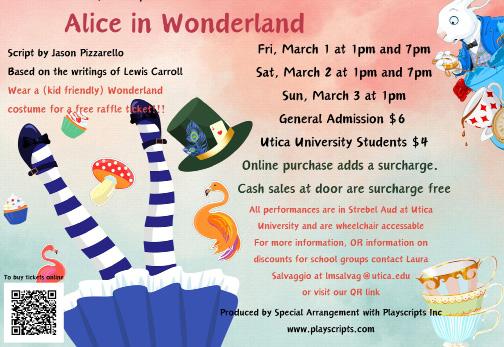
has been an exciting experience for Monaco, she said. To prepare for any role, Monaco starts by watching or rewatching the movie. She then studies mannerisms, facial expressions and voices. She also rehearses her lines in and out of practice throughout the day.
Rachel Wolfe, an associate professor of theatre and the show’s director, tries to pick different genres every year and is excited to produce her first children’s play.
“It has been a lot of fun to work on, because we get to do silly things like juggling and tumbling that rarely make it into shows aimed specifically at adults,” Wolfe said.
With a large production like “Alice
in Wonderland,” many students were casted so they were allowed an opportunity to learn the art form, and that makes the production exciting, Wolfe said. Her favorite part of the play is when the cast is all on stage at the end interacting with each other because everyone comes together.
The biggest challenge for the production was complying with fire codes and determining where they would host the play. Since there was such a large number of cast members, they faced the challenge of exceeding the amount of people allowed in one space. They are now staging the play in Strebel Auditorium.
“I’m hopeful that audiences coming in will still get the feeling that
they have stepped into Wonderland, but it’s just more technically difficult to fill a larger space with wonder and strangeness than a smaller one,” Wolfe said.
There are five
performances: Friday, March 1 and Saturday, March 2 at 1 and 7 p.m. and Sunday, March 3 at 1 p.m. Tickets are $6 for general admission and $4 for students and can be bought at the door or through Eventbrite online. Online ticket purchases carry an additional surcharge. Anyone who wears a kid-friendly costume will receive a free raffle ticket.



In honor of Black History Month, several offices and organizations at Utica University have hosted events on campus, including the Black Student Union, Student Living & Campus Engagement, Residence Hall Association and the office of Diversity Equity Inclusion and Belongingness.
The events were a combination of fun and educational games that honored famous Black individuals for their accomplishments and impacts. According to Mark Kovacs, the Executive Director of DEI&B, one of this month’s events was a continuation of a previous event.
“On Valentine’s Day night, we had an event called A Love Letter to the Culture: Part II which was a continuation of the love letters we started during the annual Kwanzaa event BSU has in the fall semester,” Kovacs said. Other events coming up this month include:
• A Black history scavenger hunt started on Wednesday, Feb. 21 and runs through Wednesday, Feb. 28
• DEI&B Black Voices in Healthcare and STEM panel will take place at 6:30 p.m. Tuesday, Feb. 27 in Hislop Auditorium, located in Thurston
Hall
• BSU will host a Black Song Quiz to end Black History Month at 6:30 p.m. Thursday, Feb. 29 at 6:30 in Pioneer Cafe
Other campus organizations have already celebrated Black History Month with events earlier this month such as the Black History Month bingo event that happened on Feb. 15, which combined bingo with a set of Black history trivia questions and a chance to win prizes. The prizes ranged from declining balances to a new Keurig coffee machine.
The SLCE office has also displayed Black History Month bulletin boards around campus for students to read as they walk through the academic buildings.
According to Kovacs, one of the most important things Black History Month does is give an opportunity for people to remember what’s happened in the past but also help people learn more about Black culture and most importantly, Black history.
“Dr. Baird says this statement quite often, “Lest we forget,” Kovacs said. “So by educating and by recognizing Black history, we’re making sure that we don’t forget some of the past within history.”
Kira Maddox, the DEI&B communications and community relations
coordinator, said it’s important for students to participate in Black History Month events because students often learn a small sliver of history in the classroom and some never learn about inspiring individuals and movements that have happened.
“Black History Month is a time to celebrate the achievements and contributions of the Black community,” Maddox said. “But also to challenge yourself to ask: What don’t I know? Who wasn’t I told about? What am I missing? Black history should be seamlessly weaved into all historical teachings, but until then we hope the month can be a catalyst to independent learning.”
According to Maddox, one of the biggest
takeaways from the events is promoting the values of unity and belongingness within all the university’s programs—a person doesn’t have to be Black to celebrate Black History Month.
“We can all learn from one another’s stories, cultures, and experiences, and we should always be working to seek out one another’s humanity,” Maddox said. “ I say this often in our DEIB presentations, but college is a time for learning and growing, and that includes learning about the people and the society around you. If you haven’t thought this way before, let Black History Month be your starting point.”
For more information, visit PioHub at utica. presence.io.



The Strebel Student Center is a hub of activity for students on campus equipped with bean bag chairs, a ping pong table and gaming consoles. Students can be found there at all hours, engrossed in activity, but the Pio Pub, a place which used to be central for interaction and socializing isn’t as busy as it was in its prime.
Located in Strebel, the pub was a place where students and professors met to grab a beer and socialize after class regularly, or even met there as a class, Dean of Students Emeritus Robert Woods said.
The Pioneer Pub, as it was unofficially called, had regular operating hours and served beers to a smaller campus and younger students since the 1960s. Through the decades, the pub evolved with the times to meet the needs of the campus community.
In 1984 when the drinking age changed from 18 to 21, attendance at the campus watering hole took a hit. The new law was a “blow to the idea of having faculty and students interact on a social basis,” Woods said.
The drinking age change motivated shifting the pub from a social drinking environment to “Itza Pizza” in 1985. Pub nights continued centered around student or club

activities like fundraisers, karaoke nights and athletic events, but not as regularly as before and weren’t as well-attended.
“A lot of people took classes in the evening after class at 10 p.m. so it was common for professors to go over to the pub and have a beer with students,” Woods said.
Mark Kovacs served as Director of Resident Life in 1989 and said he remembers it as a big space full of half broken furniture with a bar on wheels stored in the closet, and served beer from kegs to students, faculty and staff. A yearbook from 1980 shows a photo of a Pub Governing Board and Bartenders, all of which were students.
The first remodel of the Pio Cafe was during the late 1990’s (about ‘97) and had an “Adirondack” theme to it, and included all new furniture.
“It was a push to have fun but the participation
just wasn’t really there… because the change in the drinking age ‘kind of changed everything,’” Kovacs said.
According to Kovacs, the focus of the pub was drinking and socializing, and students learned to drink responsibly at the college because their professors or friends would tell them if they should slow down or if they’ve had one too many beers. The change in the drinking age caused a missed educational opportunity, Kovacs said.
“In that setting, someone can help educate you rather than it becoming illegal and going behind closed doors,” Kovacs said. “I would rather have someone learn how to drink responsibly while they’re in college than when they are 21 and ready to enter the workforce.”
The Pub had a full remodel in the summer of 2011 during President Todd Hutton’s tenure. It was remodeled into the
curved L-shaped bar tucked into the back corner of the space that it is now and was formally named Pio Pub.
Sodexo General Manager Damian Boehlert was instructed to open the pub from Thursdays to Saturdays.
“Thursday was the only day we ever did anything decent[in sales],” but said “it was never really successful,” probably due to the drinking age splitting up friend groups and the majority of seniors of drinking age living off campus.
After COVID, the pub closed and opens only for special occasions. Boehlert said clubs, teams and groups can still hold events at the pub but have to organize with him beforehand to arrange for a bartender, staff to make food and security officers.
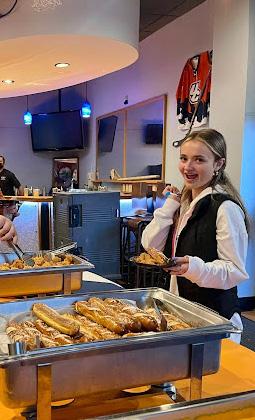


Sar Strong was just over 4 years old when he started taking piano lessons. Unlike others, he wasn’t forced into playing. He did it because it was fun. Strong also played the violin in high school through college. But with the violin being “more of a social instrument” and having not played it since then, he stuck to the instrument he was best at, the piano.
“[The] piano is fun because you can play something that sounds like an entire song,” Strong said. “You have melody. You have accompaniment. You have rhythm. It’s a very complete instrument.”
On Feb. 21, Strong performed a solo recital during the Harry F. and Ruth Jackson Lunch Hour Series and will return on March 20 with saxophonist and clarinetist Ronald Caravan for a classical performance.
Strong doesn’t write his own music. He tried it before in high school, but doesn’t think he has “great ideas as a composer.” Instead, he enjoys playing music from other musicians.
As a classical performer trained to “faithfully follow what’s on the page,” Strong’s ability to read music quickly has allowed him to become good at “translating the

page.”
Despite such a long career, he continues to develop more efficient techniques because “it’s much harder to play softly than it is to play loud.”
Pianists are without the luxury of playing on their own instrument, Strong said. Though the places where he performs have pianos he’s used multiple times, each still has a different feel, response and personality.
According to Strong, the majority of his time is spent collaborating with other musicians. In 1996, while completing his master’s degree at Syracuse University School of Music, Strong met Caravan, who
taught at SU from 1980–2015. The musicians began collaborating in 1998.
“Our musical relationship certainly grew over the ensuing years,” Caravan said. “We also bring genuine humility to our collaborations [while] welcoming one another’s suggestions and being willing to be musically flexible for each other. There has never been any ‘solo ego’ in our musical collaborations, and that suits both personalities very well.”
In 2016, the two released an eight-part volume series titled “Single Reed Expressions.”
Both have performed at the university separately
on several occasions. The performance — scheduled to last approximately an hour — will feature a mixture of clarinet music, alto saxophone music and soprano saxophone music. While at the performance, attendees can expect to hear pieces that are not “commonly performed.”
“We want to expose people to things they aren’t necessarily familiar with while still giving them all the comforting things of a musical performance that they would expect,” Strong said.
Caravan added: “All our audiences get our full attention and preparation, and they deserve no less.”


Studying abroad was my dream since high school and being at Utica University since August 2023 has been one of the best experiences I have ever had. I have met amazing people from different countries and cultures, and created many sweet memories here. As a transfer student from Malaysia, I am currently a junior majoring in business administration.
Cold weather was not a thing for me in Malaysia. When winter started, I was often asked “How do you find the weather here?” or “Do you like the cold weather?” My answer is always the same: I like snow but I do not like cold weather.
Malaysia has only hot and rainy seasons, so the thought of experiencing all four seasons was exciting for me, and autumns in Central New York do not disappoint. Fall colors have always been my favorite, and getting to see them with my own eyes was like a dream come true. Watching the trees change colors and then the leaves fall every day just like what I saw in movies and videos makes me wish Malaysia had this beautiful season, too.
The weather changed from hot to cold and snow fell. Even though it has not snowed a lot this
winter, I am glad that I made snow angels and a snowman when I had the chance. Now, the weather is still cold but spring is just around the corner. I cannot wait to see the flowers bloom, and I love it when people say spring is all about new beginnings. The leaves and plants that begin to grow again and flowers bloom symbolize starting fresh and starting over.
I love the fact that the campus is always filled with activities. One of my favorites was Homecoming Weekend 2023. The campus was filled with celebrations that included spirited alumni and students. There was a carnival, Presidential Todd Pfannestiel’s inauguration, sporting games and other activities. The carnival was so much fun with the rides, games, cotton candy, and more. I am blessed to celebrate Utica University’s rich history and traditions.
As someone who is not into sports, going to sporting events is another story. I remember watching the football game for the first time at Gaetano Stadium.
I did not understand the rules but I joined in cheering with the crowd, until I realized that Utica University was leading and they won the game. The feeling was indescribable and I felt pride in how passionate the players were and
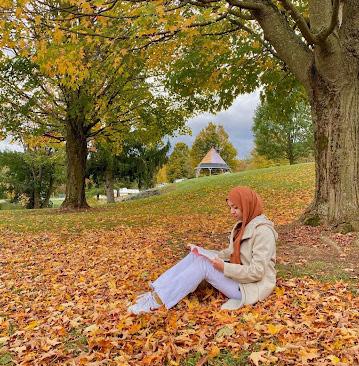
how supportive and loud the crowd were.
The New York State Fair in Syracuse was remarkable. The rides there were fantastic, and so was the concert, exhibits, animals and food. Many vendors served different kinds of food including snacks like deep-fried Oreos and candy apples. Both of them were so unique and made me remember them clearly. As an amusement park enthusiast, I loved the rides and games. Even though the fair was packed with people, I enjoyed quite a few rides after queuing in a long line. One day is not enough to explore everything.
Being far away from
home makes me feel homesick sometimes, but I am grateful that I am not alone here; I have my brother who lives in Utica and I am surrounded by the best people. Seeing my brother and his wife and children bring happiness into my life every day. If I am not busy with school, I often spend my time playing with my nephews and nieces. Growing up makes me realize that playing with children is one of the ways that I could escape from reality for a moment because I could use my imagination and have fun without having to worry about anything. Having a great companion is what keeps me going and I truly cannot wait to see what the future holds.


Utica resident Heather Wasielewski wasn’t always an outdoors person, but when she met her now husband Zac, things changed. He introduced her to enjoying nature—a part of her life she took for granted until then. When she had a son, the outdoors became a place of refuge because there aren’t many things for moms to do with their children in Utica.
“Parks are huge for that aspect,” Heather said. “We spent the first 5 years of his 7 [years] in parks.”
Wankel Park, one of the only parks with a traditional cooling pool, is just down the road from their home. Both Heather and Zac are medicated for and struggle with anxiety and consider the outdoors vital for their well-being.
“People talk about being in the moment and it helps a lot because when you’re in some kind of nature, you’re typically not staring at your phone, you are paying attention to your surroundings more and it takes your focus outward rather than inward,” Zac said.
According to a recent report conducted by Urban Institute, communities with higher levels of green space and tree cover use less mental health
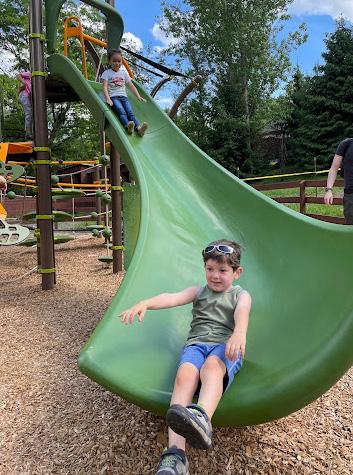
services and treatments. Evidence showed that proximity to and use of parks, green space, and tree cover correlate to greater levels of physical activity.
“Outdoors takes away a lot of the social and personal issues that lead to the anxieties,” Zac said.
Mental health is a priority for local residents
A 2022 health assessment conducted by the Oneida County Health Department, Rome Health and the Mohawk Valley Health System revealed that:
• 40.5% of respondents said someone in their home struggled with depression and anxiety
• 52% of respondents said they spend less than 30 minutes a day exercising or performing some physical activity
area of fun that people just don’t get to.”
During a sunny day, Caz Wasielewski plays at Utica park.
• More than 60% of participants in the online survey ranked mental health as a top priority for Oneida County
The Wasielewskis reliance on nature for mental peace and clarity isn’t a new finding. According to the National Park Service, a walk in the park is a great way to help physical and mental health. Vast amounts of evidence document the health benefits, ranging from reduced anxiety and depression to improved birth outcomes.
The Switchbacks 1.8 mile loop trail at Roscoe Conkling Park is a popular destination for the Wasielewskis.
“We cross country ski, take downhill skis and play through the woods,” Heather said. “There’s an adventure right up at the Switchbacks. It’s a whole
Utica parks a “huge benefit” and “huge responsibility”
Parks and Recreation Commissioner David Short said Utica is one of five cities in the county that has a ski slope right in the middle of it. Utica has 21 different city, district, neighborhood and passive parks. Each park has different capabilities, but they all have green space.
“They’re a huge benefit to the residents for mind and body but they’re a huge responsibility to maintain,” Short said.
All of Utica parks combined offer more park acreage than New York City’s Central Park and lots of green space to keep Utica residents’ mental and physical health balanced.
“A plant needs water and we’re a family, with my son, that needs to be outside,” Heather said.
“And we sometimes have to remind ourselves about how important it is. That’s why parks are important.”
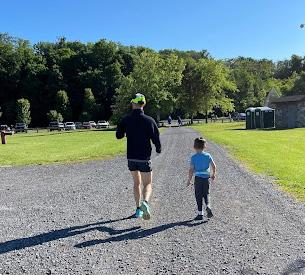


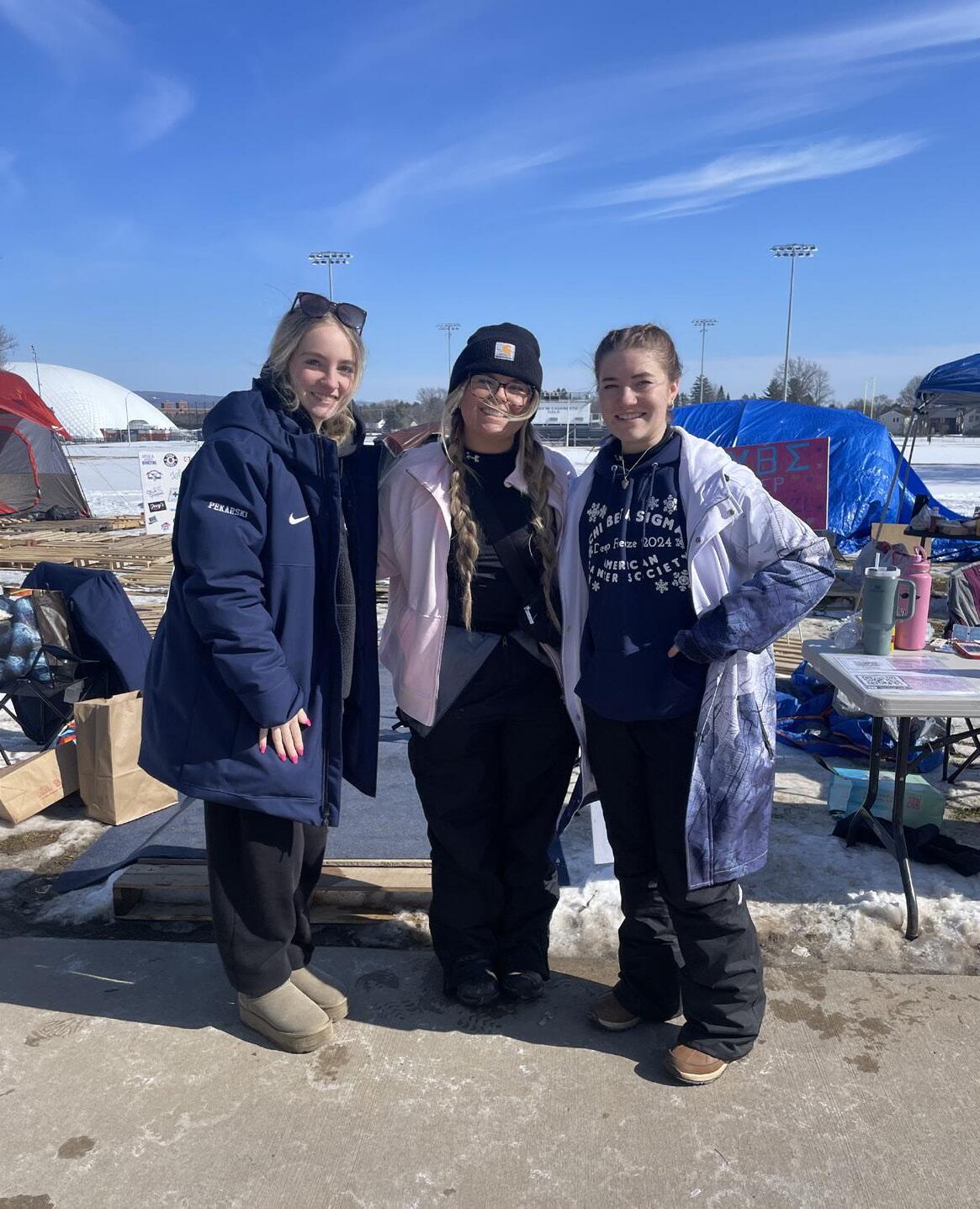


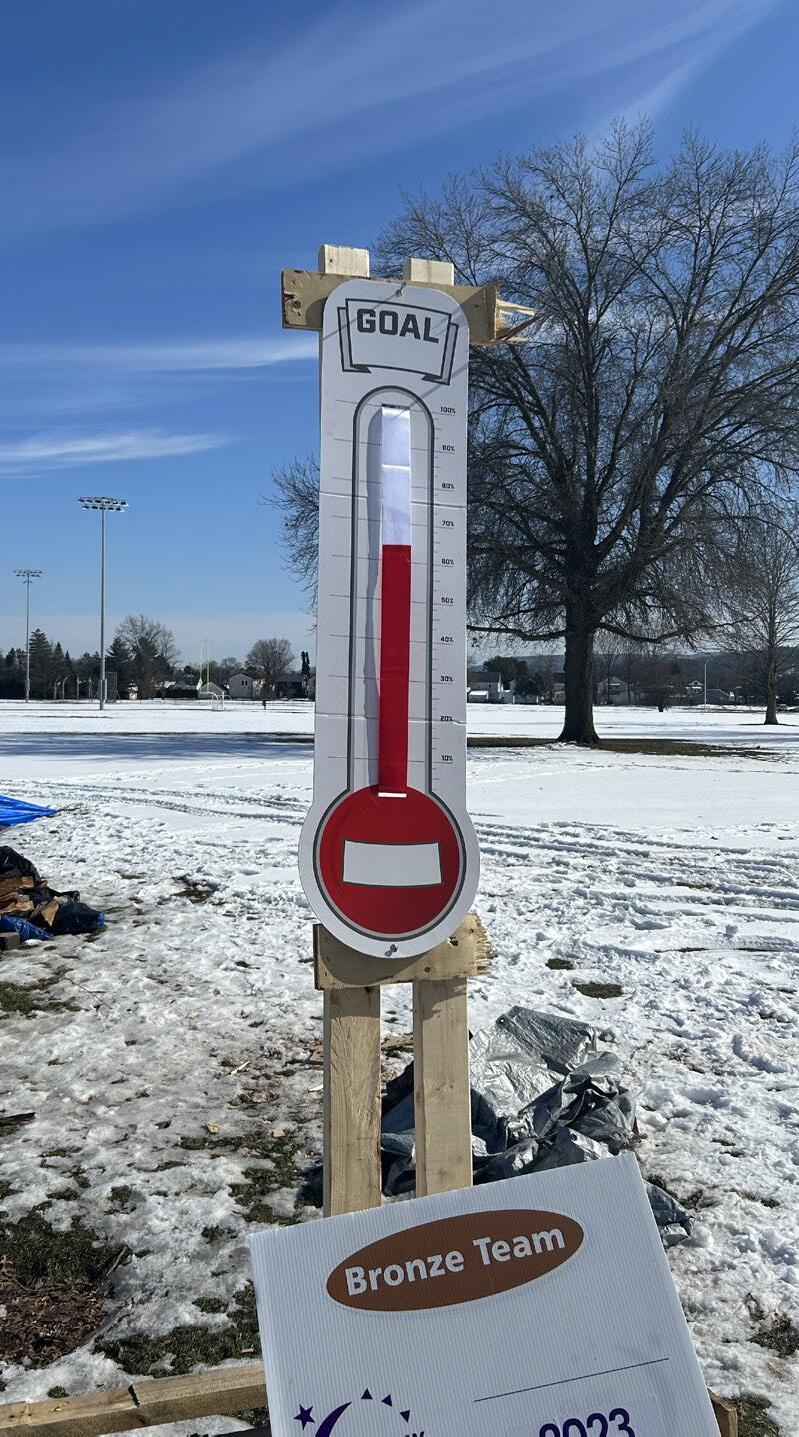
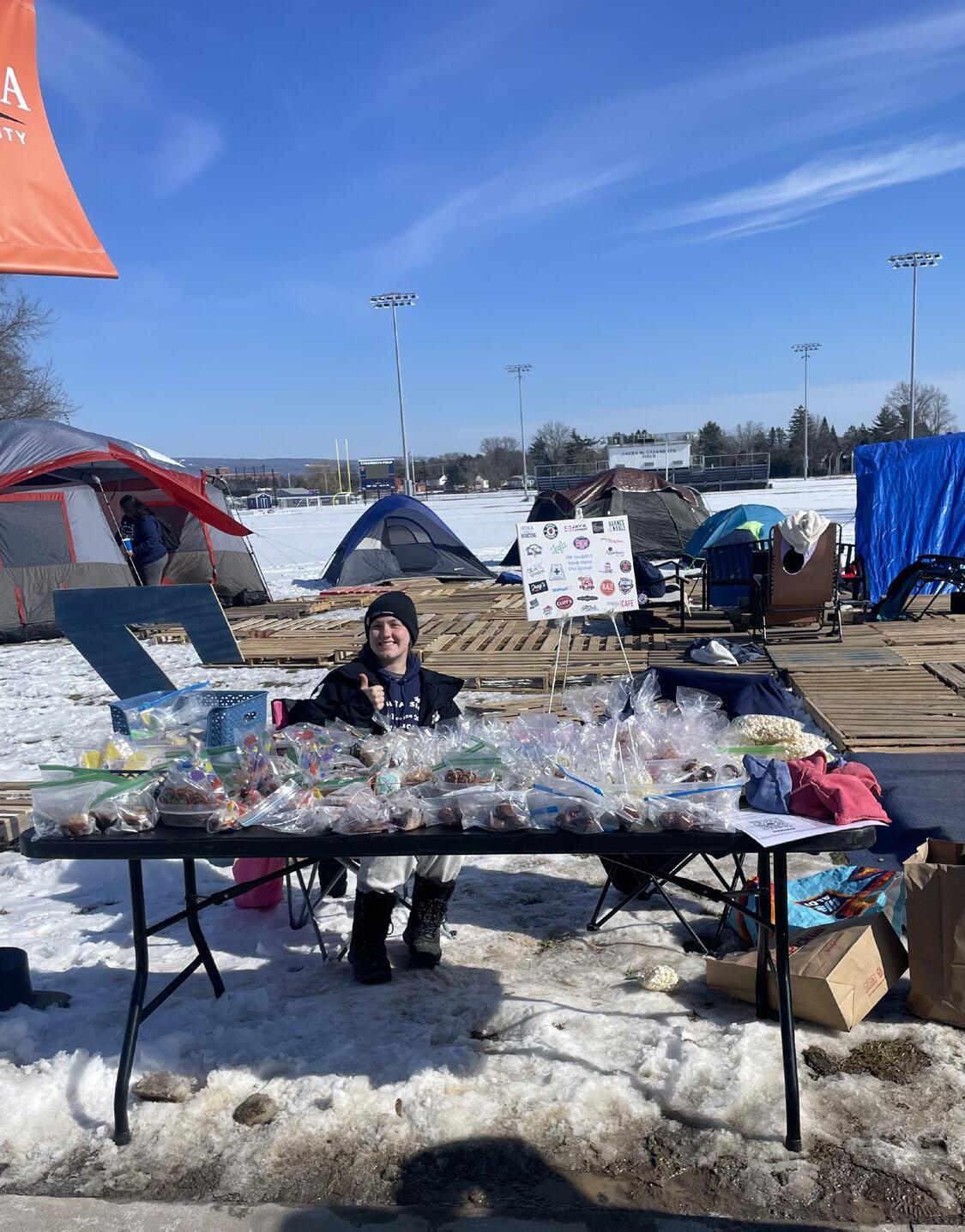
Chi Beta Sigma is “Freezin’ for a Reason” this week by braving the cold from Sunday, Feb. 18 through Sunday, Feb. 25. This is to raise money and awareness for the American Cancer Society and the sorority already reached 85% of its $5,000 goal on Wednesday, Feb. 21. They held a bake sale, cornhole and basket raffles outside of Strebel Student Center on Feb. 21 as well. Chi Beta Sigma learned how to tolerate cold temperatures from Campus Safety officials and by taking preparation classes.


On Feb. 11, 123.4 million people tuned in to watch Super Bowl 58 and it is estimated that at least 202.4 million people watched at least part of the broadcast. With this, the clash between the Kansas City Chiefs and the San Francisco 49ers ended up being not only the most-watched Super Bowl of all time, but the most-watched television program ever.
The energy from the sidelines and a showdown between two great quarterbacks: the underdog Brock Purdy of the 49ers and the well-established Patrick Mahomes of the Chiefs, was sure to drag in a crowd. This game definitely made a wake in the waters of Utica University.
With an amazing performance from their defense and some fortuitous plays from their number-one-ranked quarterback, the Kansas City Chiefs managed to pull off a third Super Bowl win in five years. The game ended in a 25-22 overtime victory against the San Francisco 49ers in only the second overtime game in Super Bowl history.
The Chiefs have Patrick Mahomes and his
postseason magic to thank for their second consecutive Super Bowl victory. Despite the unrelenting pressure placed on him in the first half and the 49ers’ unshakeable defense which at times seemed too merciless to overcome, Mahomes carried his team on his back when it mattered most.
According to Joey Berrios, a nursing major and first-year student, Mahomes didn’t perform to the best of his abilities at the beginning of the game.
“Towards the end, he locked in for sure,” Berrios said. “It was inspiring to see him keep fighting even when they were so close to failure.”
One of the greatest highlights of Super Bowl 58 was the 55-yard field goal in the first half of the game. Jake Moody, the 49ers’ rookie kicker, placed the first three points on the board, giving San Francisco an early lead of 3-0. So why is this kick so important? For three decades, the holder of the longest field goal in a Super Bowl was Buffalo Bills’ Steve Christie. Christie accomplished a 53-yard field goal in Super Bowl 28.
Jake Moody became
the record holder of the longest field goal in Super Bowl history. This was until the third quarter when the Chiefs kicker, Harrison Butker, broke the record again with a 57-yard field goal.
First-year student Elaina Furtadora-Hill said the kicks were “pretty insane.”
“The first kick was a great underdog moment,” Furtadora-Hill said. “For the second kick, I almost thought the ball wouldn’t make it. I am interested in seeing how these guys grow with their teams over the years.”
Usher was this year’s halftime performer, but the show included many phenomenal guest appearances, including Alicia Keys, Jermaine Dupri, H.E.R., will.i.am, Lil Jon and Ludacris.
Usher danced his way on stage while singing his 2004 hit, “Caught Up,” before transitioning into his song “U Don’t Have to Call.” Later, when he moved to the stage, he sang “Superstar” before breaking into his dance anthem, “Love in This Club,” which he performed while doing the moonwalk.
He followed that with a duet of “My Boo” with Alicia Keys, before moving into the

ballad section of the performance, where he sang beloved tracks like “Confessions,” “Burn,” and “U Got It Bad.”
Singer H.E.R., who has a song, “Risk It All,” with Usher that appears on his new album, “Coming Home,” performed a guitar solo during the performance of “Bad Girl,” while will.i.am showed up to sing “OMG.” Usher closed out his standout show with a rousing performance of “Yeah!” alongside longtime collaborators Ludacris and Lil Jon.
Emma Stanek, a firstyear occupational therapy student, said the halftime show could have been better, but Usher’s appearance was cool.
“I also didn’t know many of the songs he performed until the end,” Stanek said.
Mariani’s take:
Super Bowl 58 was nothing short of amazing. With countless records broken and extraordinary energy from the halftime show, it’s no wonder this game was the most-watched television program in history. It is safe to say that both teams played their hearts out and certainly impacted Utica University students.


It’s 6 a.m. on a Wednesday in the Utica University athletic dome, and athletes begin to flow in, greeted by a smile and a loud “good morning!” Quickly, the once quiet dome is the loudest, most active place on campus. This is the atmosphere Nate Fredsell, Utica’s strength and conditioning coach, thrives in.
Originally, Fredsell wanted to be an athletic trainer. His journey started next door at Mohawk Valley Community College, where he spent two years studying sports medicine and athletic training.
“I taped so many ankles, I was like, ‘I don’t know if I can do this anymore,’” Fredsell said. “I don’t even like feet, and I’m taping the ankles of football players.”
From there he contacted his cousin, who went to school for exercise science and was able to learn more about that job description.
“I was like, ‘That’s way better than taping ankles and I was right, it is way better,’” he said.
With his sights on becoming a strength and conditioning coach after he graduated from MVCC, Fredsell furthered his education at Ithaca College where he pursued a bachelor’s degree in kinesiology
and exercise science.
He graduated from Ithaca in 2016 and started working at Sports Performance Institute Fitness in Utica. In his first two years at SPI, Fredsell took a summer internship at South Carolina University in 2018 which solidified the career path he wanted to take.
“That was kind of my next move. I was gonna go work at a big school,” he said. “Then the head guy here left, and they called me, and I was sick of not getting paid and doing a copious amount of work not to get paid, so here I am.”
The more experience and certifications someone gets, the better off they are in the strength and conditioning world, Fredsell said, because in addition to an exercise science degree, a strength and conditioning coach must be certified.
Among the studentathletes, Fredsell is known for making connections with everyone on the team, cracking jokes and keeping things interesting.
“He’s good at what he does; he creates a unique relationship with every student-athlete he trains,” said Hannah Johnson, a senior volleyball player. “His intense passion for our success is what drives him to push us to be our best every day.”
Bailey McElwain, a senior

softball player, said the care Fredsell has for his athletes is unmatched by anyone because he cares about athletes as human beings.
“If he notices something is wrong, he’ll talk to you,” she said. “He’ll sit there and have a conversation with you even if that means you aren’t working out for a few minutes. He cares more about how you are mentally than physically – he cares about both –but that mental aspect, I’ve never seen a coach truly care about that
aspect before.”
Fredsell said he loves his job and doesn’t want to do anything else. He likes to live in the moment and not focus on the next move because it would distract him during his current workouts.
“I try to be the best that I can here and every day and if somebody comes and gets me and it’s a better opportunity, then someone comes and gets me,” he said. “Until then, I’ll be the best trainer in Utica, New York.”


Growing up in Moscow, the largest city in Russia, international student athlete Vladislav Pshenichnikov experienced a whole new world transitioning to Utica.
Vlad, who is in his first year of playing hockey for Utica, is pursuing a degree in sports management and hopes to play professional hockey following graduation.
“Playing professional hockey has always been my goal since I was young, I started playing when I was just 4 years old,” Pshenichnikov said. “I always thought that playing your favorite game while getting paid and having a chance to travel to see the world is a great lifestyle.”
The transition from Russia to Utica was an entirely different experience, according to Pshenichnikov, from the players to the coaches to the overall culture and environment.
He came to the United States for the first time when the pandemic hit in 2020 after he graduated from the Russian Embassy in Sweden, then started his first full year of junior hockey in Florida.
“I had a great time meeting new people and experiencing different cultures,” Pshenichnikov said. “There were a lot of players from Sweden on the team that year and it was pretty easy for me to adapt because I’ve
spent a couple years playing in Sweden earlier in my career.”
After the 2020 season, during the following junior season, he returned home to Russia and continued to play in Yekaterinburg, only three hours away from his hometown.
Even though he was eager to get back to the United States because he enjoyed his time here, Pshenichnikov said he had an incredible year of growth while facing tough teams in Russia during that time.
Because he got so used to the American lifestyle, it was a relief to finally speak to people in his native language - something he misses while he’s here in Utica.
Pshenchnikov was already familiar with Utica, having played for the Junior Comets.
“Since I already had experience playing in American leagues, I knew what to expect but I still had to make certain adjustments to the way I play,” Pshenichnikov said.
Although coming to Utica wasn’t too much of an adjustment for him since he had prior experience in the U.S. and playing for the Junior Comets, Pshenichnikov said even though he was somewhat accustomed to playing hockey in the U.S., he still had to get used to a number of changes when playing as a Pioneer. From the style of hockey, the way players think on the ice,
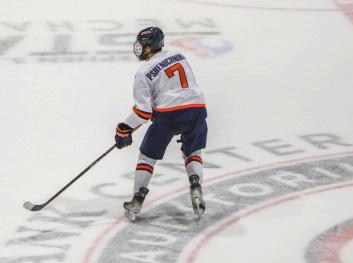
the pace of the game and communication all had a significant impact.
“The hardest part of being away from home is certainly not being able to see all the relatives, friends and close people,” Pshenichnikov said. “Of course I miss my family members who are not able to come to visit, my friends and my pets.”
The language barrier was a challenge for him but after spending some time getting adjusted in Utica he has made a lot of new and important connections and met some amazing people.
Head Coach Gary
Heenan said he’s done very well at learning the English language and getting acclimated to the North American lifestyle.
Throughout his time playing for Utica, Pshenichnikov had scored four goals and had five assists.
“Vlad is a great
teammate, he’s like that annoying little brother that is always saying something funny and in your face,” teammate Kimball Johnson said. “He always has a smile on his face with contagious positivity. It’s obvious he loves hockey, and loves his teammates!”
Pshenichnikov said he is pleased and grateful to have this opportunity to continue his studies and hockey career as a player for Utica University.
“Since I’m from such a large city, I have to say that some of the best things about Utica are the small town atmosphere and everyone’s love for hockey,” Pshenichnikov said.
Heenan describes Pshenichnikov as a serious minded person.
“He works extremely hard,” Heenan said. “He’s a very skilled player still learning the college game.”


Laura Meade’s academic accomplishments speak for themselves.
She is currently a graduate student majoring in business management and recently graduated from Utica University with a bachelor’s degree in business management - all while maintaining a 3.0 GPA during undergraduate and earned U.S. Track & Field and Cross County Academic Honors.
Aside from her academic accomplishments, Meade has been a star on the track. She does jumps, sprints, hurdles and multies. According to assistant track coach Sam Catterson, she is “the most versatile athlete of all time.”
“I mean, this girl runs everything from cross country races to the 100m hurdles, triple jump, and has even become an impressive competitor in throwing events. Yet she continues to show a constant desire to learn new things,” Catterson said.
Throughout her time at Utica University, “Speedy Meadey,” as some call her, has set several school records. She is a four-time Empire 8 champion in the triple jump, the heptathlon, the pentathlon, the 400 hurdles, and has
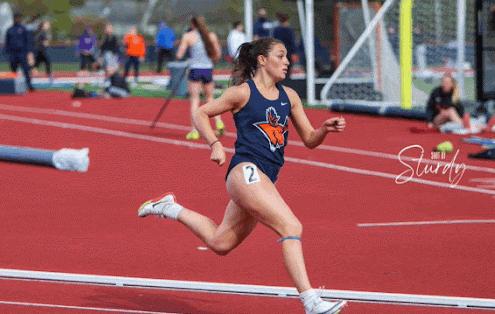
achieved field athlete of the meet. She is currently preparing for her fifth season of track and field at Utica University.
“She has insane drive,” teammate Justin Valentin said. “Laura never stops proving that there is nothing that she can’t do.”
Meade suffers from patella tendinitis after tearing the tendon during the previous season’s regionals. She will only be participating in outdoor track this season for the first time in order to rehabilitate her knee in time for the outdoor season. Meade said she is dissatisfied with her decision to sit out the indoor season and how this injury is seriously impacting her training.
Her greatest concern is the possibility that she won’t be able to jump in her final season, as triple jump is her favorite event. Because she isn’t able to train how she would like to, she fears that this injury will have a greater effect on her performance.
“Though I’m very sad that I won’t be able to compete with my team indoor this season, long term, I believe it will be best to give myself a little more time to recover from my injuries so I can perform to the best of my ability outdoors,” Meade said.
She had a spectacular Spring 2023 season. She not only placed third in her first-ever javelin throw at the Utica invitational last outdoor season, but
she also ranked sixth alltime in program history with a throw of 29.94 meters.
In the heptathlon, she additionally established a new program record, finishing fifth out of sixteen competitors with a personal best 4,027 points. She ran the fastest 200-meter time in the field over the course of two days, earning one of the competition’s highest single-event point totals. In addition to being a personal best, she finished the 200 meters in the third-fastest time in school history.
CONT. ON PAGE 16

CONT. FROM PAGE 15
“Her commitment and love for her sport is on another level,” Claudia Simione said. “She puts in countless hours on the track and is always trying to improve. She strives to be the best at everything she competes in and isn’t satisfied until she’s done so. Overall Laura is a talented athlete on and off the track, and you can always count on her to show up.”
Meade said being an athlete is one of the best experiences she has had at Utica University and has introduced her to many of her closest and best friends. She expressed love for her coaches and their positive influence on her and her teammates. She said they push her to reach her greatest potential and inspire her to be the best she can be. Her passion for running dates back to her kindergarten years, she also recalls beginning to compete in 5k races in the third grade. She ran both track and field and cross country throughout high school.
“When I was in kindergarten I would wake up every morning and go
for a run before school while my dad would follow behind me in his car until I was done.” Meade said.
Without hesitation, she said her father is her greatest supporter and inspiration. Since he was also a passionate track and field athlete, they shared an intense love for running. He never missed a meet.
In 2021, during her senior year, Meade’sfather passed away and it had a profound impact on her.
“After he passed I knew I had to continue to make him proud, so I went on to set four school records,” Meade said. “My dad will always be my biggest source of motivation and I will never stop pushing myself to make him proud. Everything I’ve done, ive done for him.”
Aside from her love for track, Meade was also a softball player through high school and said it offered her a new sense of confidence and mental toughness.
“I kept looking for ways to stay in touch with (my dad) after he passed away, and the one thing I knew I could do was do all in my power to maintain
my love of running and compete at the collegiate level,” she said. “I realized it would be challenging to play two sports in college. I just knew that my love for softball took a backseat, despite the fact that I adore the game.”
Aside from all the accomplishments she’s made in the sport, Meade is incredibly grateful for the lifelong friendships that Utica Track and Field has helped her form and she considers that her greatest accomplishment at Utica.
“Speedy Meade dominates at everything she does,” alumnus Sophie Henderson said. “ I watched Laura have one of her best seasons my last year at Utica and it was so amazing to watch and train alongside her. She was the best teammate I’ve ever had, she was supportive, encouraging and always loved having fun.”
Along with her family, Meade owes her success to her team, coaches and friends that she has made through track. She expressed her gratitude for the coaches that have pushed her along the way. She said her coaches saw

potential in her that she didn’t, and gave her the courage to try new things. Meade claims that her teammate who supports her the most is thrower Justin Swavley.
“She brings the different event groups together and at meets she can always be found cheering everyone on,” Swavely said. “ Laura is one of the hardest working athletes I’ve met and she’s shows it by holding multiple records in multiple events. That’s not easy to do.”
Excelling in the classroom is a top priority while managing to make time for a personal life with family and friends. She intends to finish her final season at Utica University with a bang. She has set her sights on setting a new personal best in the vault once more, and based on the achievements she already performed, there isn’t much that can stand in her way.
“I hate losing more than I love winning, It’s a unique feeling,” Meade said. “But then again, without the help and support of my teammates and coaching, it’s impossible to succeed.”
